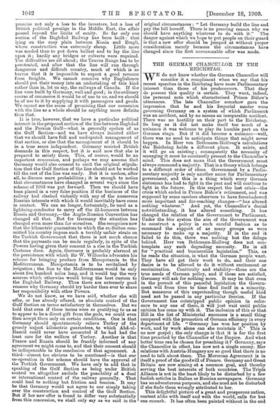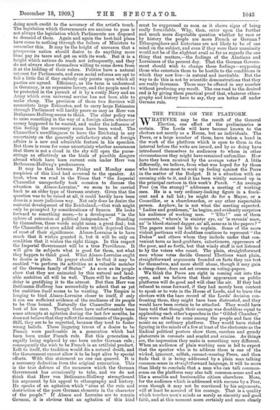Tiuii GERMAN CHANCELLOR IN THE REICHSTAG.
WE do not know whether the German Chancellor will consider it a compliment when we say that his recent speeches in the Reichstag have more Parliamentary interest than those of his predecessors. That they do possess this quality is certain. They want, indeed, the personal note which characterised Prince Biilow's utterances. The late Chancellor somehow gave the impression that he and his Imperial master were governing Germany on a system of which Parliament. was an accident, and by no means an inseparable accident. There was no hostility on their part to the Reichstag. So long as it did not make itself too much of a nuisance it was welcome to play its humble part on the German stage. But if it did become a nuisance—well, there was no need to anticipate things that might never happen. In Herr von 13ethmann-Hollweg's calculations the Reichstag holds a different place. It exists, and it will go on existing ; consequently the necessity of managing it must be constantly present to the Chancellor's mind. This does not mean that the Government must always command a majority. That is a theory which belongs to a different order of ideas. Government by a Parlia- mentary majority is only another name for Parliamentary government, and this is a thi g which every German statesman has had to fight in the past and will continue to fight in the future. In this respect the last crisis—the crisis which ended in Prince Biilow's retirement, and was supposed by some careless observers to have foreshadowed more important and far-reaching changes—" has altered. nothing whatever." And yet, the Chancellor's denial notwithstanding, it has altered something. It has changed the relation of the Government to Parliament. "Under the bloc system the aim of the Government was to construct a policy in such careful fashion as to command the support of as many groups as were necessary to make up a majority. If in the end it failed to do this, there was nothing but the deluge behind. Herr von Bethmann-Hollweg does not con- template any such degrading necessity. He is all for "practical and businesslike legislation." This, as he reads the situation, is what the German people want. They have all got their work to do, and their one desire is to be allowed to do it without excitement or recrimination. Continuity and. stability—these are the true needs of German policy, and if these are satisfied, Germany will ask for nothing more. It may be that even in the pursuit of this peaceful legislation the Govern- ment will from time to time find, itself in a minority. But measures of this unpretending though useful kind need not be passed in any particular Session. If the Government has outstripped public opinion in refer- ence to any one of them, it will just wait until public opinion has come up with it. The inclusion of this or that Bill in the list of M. 'sterial successes is a small thing compared with the promotion of German efficiency in every department of life. "Germany has won her position by work, and by work alone can she maintain it.' This is no new gospel ; the only change is that it is for the first time preached by the Chancellor of the Empire. And what better time can be chosen for preaching it ? Germany, says the Chancellor in effect, has now not a single enemy. Her relations with Austria-Hungary are so good that there is no need to talk about them. The Moroccan Agreement is in itself a proof of the goodwill of France. Germany and Great Britain are now aiming at a, common goal, and thereby serving the best interests of both countries. The Triple Alliance is not in the least likely to be disturbed by a few foolish articles in Italian or Russian newspapers. Germany has no adventurous purposes, and she need not be disturbed if she finds them wrongly attributed to her.
This delightful picture of a great and prosperous nation, content alike with itself and with the world, calls for but one remark. It has often been painted without in the end doing much credit to the accuracy of the artist's touch. The legislation which Governments are anxious to pass is not always the legislation which Parliaments are disposed to demand of them. Again and again the best-laid plans have come to nothing through the failure of Ministers to remember this. It may be the height of unreason that a prosperous nation should desire to do anything more than pay its taxes and get on with its work. But it is a. height which nations do reach not infrequently, and they do not always show themselves willing to come down from it at the bidding of their rulers. Politics have a natural interest for Parliaments, and even social reforms are apt to fall a little flat if they embody only points upon which all parties are agreed. Efficiency, as the term is understood in Germany, is an expensive luxury, and the people need. to be protected in the pursuit of it by a costly Navy and an Army which even universal service has not been able to make cheap. The provision of these two Services will necessitate large Estimates, and to carry large Estimates through Parliament will hardly prove so easy as Herr von Bethms un-Hollweg seems to think. The older policy was to raise something in the way of a foreign alarm whenever money happened to be wanted, and under the influence of this feeling the necessary sums have been voted. The Chancellor's unwillingness to leave the Reichstag in any uncertainty on the generally satisfactory state of foreign affairs is a new and admirable feature in his speeches. But there is room for some uncertainty whether assurances that there is not a cloud in the sky will open the purse- strings as effectively as the hints of possible dangers abroad which have been current coin under Herr von Bethmann-Hollweg's predecessors. It may be that between Friday and Monday some suspicion of this kind had occurred to the speaker. At least, when we read in the Times that "the Imperial Chancellor unexpectedly took occasion to discuss the situation in Alsace-Lorraine," we seem to be carried. back to an older type of German oratory-. Given that the question was to be raised at all, it could hardly have been done in a more judicious way. Not only does he desire the material development of the Reichsland,—that wish might only be prompted by considerations of finance. He looks forward to something more,—to a development "in the sphere of extension of political independence." Standing by themselves, these words might mean a great deal ; but the Chancellor at once added others which deprived them of most of their significance. Alsace-Lorraine is to have much that it wishes granted it, but it will be only on condition that it wishes the right things. In this respect the Imperial Government will be a true Providence. It will give its subjects what is good for them, not what they happen to think good. What Alsace-Lorraine ought to desire is plain. Its prayer should be that it may be enabled "to perform its activities as a valuable member of the German family of States." As soon as its people show that they are animated by this natural and laud- able ambition all will be well. There will be no further delay in gratifying it to the utmost. But then Herr von Bethmann-Hollweg has sorrowfully to admit that as yet the ambition itself seems to be wanting. The Empire is longing to bind Alsace-Lorraine closer to itself, if only it can see sufficient evidence of the readiness of its people to be thus bound. Naturally the Chancellor made the best of his case. Though there have unfortunately been some attempts at agitation during the last few months, he does not believe that they reflect the sentiments of the people. Still, they are to be regretted, because they tend to foster wrono. beliefs. These lingering traces of a desire to be French were pardonable in a generation which had been born under French rule. But this generation is rapidly being replaced by one born under German rule ; consequently the wish to be French is an artificial product. Left to itself, the tradition would die a natural death, and the Government cannot allow it to be kept alive by special efforts. With this statement no one can quarrel. It is a necessary deduction from the original annexation. This is the true defence of the measures which the German Government has occasionally to take, and we do not think that Herr von Bethmann-Hollweg strengthened his argument by his appeal to ethnography and history. He speaks of an agitation which "aims at the ruin and destruction of the pure German elements in the character of the people." If Alsace and Lorraine are to remain German, it is obvious that an agitation of this kind must be suppressed as soon as it shows signs of being really formidable. Why, then, enter upon the further and much more disputable question whether by race or by history the people are more French or German ? Ethnographers and historians are not likely to be of one mind on the subject, and even if they were their unanimity would not be of the slightest avail so far as regards the one thing that matters,—the feelings of the Alsatians and Lorminers of the present day. That the German Govern- ment should wish to change these feelings—supposing those who entertain them to be hostile to the conditions in which they now live—is natural and inevitable. But the way to do this is not by scientific demonstrations that they are really Germans. These may be offered in any number without producing any result. The one road to the desired end is by giving them practical proof that, whatever ethno- graphy and history have to say, they are better off under German rule.



















































 Previous page
Previous page